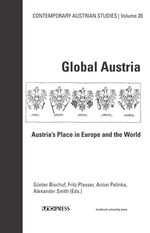Global Austria
Austria's Place in Europe and the World

Download Url(s)
https://www.jstor.org/stable/10.2307/j.ctt1n2txkwAuthor(s)
Bischof, Günter
Plasser, Fritz
Pelinka, Anton
Smith, Alexander
Language
EnglishAbstract
After the dissolution of the Austro-Hungarian Monarchy, Austria transformed itself from an empire to a small Central European country. Formerly an important player in international affairs, the new republic was quickly sidelined by the European concert of powers. Austria's post-Habsburg state suffered from enormous losses of territory and population. However, these losses did not hamper the country's innovative spirit. The essays in this twentieth anniversary volume of Contemporary Austrian Studies argue that Austria found its place in the global arena of the twentieth century, making its mark on both Europe and the world. From Freudian psychoanalysis to Auto-Marxist thought and the Austrian School of Economics, Austrian ideas continued to be vital to the intellectual community at large. Vienna remained the Austrian capital and reasserted its strong position in Central European and international business and finance. This volume also examines how increasing globalization in the 20th century impacted Austrian demography, society, and political life. Specifically, the essays discuss how Austria's place in the contemporary world became increasingly determined by the European integration process.
Keywords
History; Political Science; European StudiesISBN
9781608011384, 9781608010622Publisher
University of New Orleans PressPublication date and place
2011Series
Contemporary Austrian Studies,Classification
European history
General and world history
Politics and government

